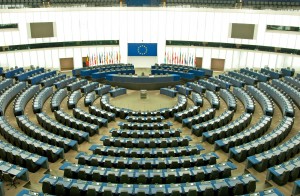After almost two years of negotiating the Transatlantic Trade and Investment Partnership (TTIP) deal, Members of the European Parliament are now assessing progress and will make recommendations to the negotiators.
Those recommendations should not be taken lightly because they will define what kind of deal the European Parliament will be willing to allow in the end. In this blog my colleague Léa Auffret and I will assess what is at stake.
Saying  yes or no to trade agreements: the new power of the Parliament
yes or no to trade agreements: the new power of the Parliament
Negotiating processes were revolutionised with the Lisbon Treaty’s entry into force. The European Parliament now has to give its consent to the ratification of a trade agreement. Trade deals are no longer the reserved playground of European Commission and Council.
A non-binding report, but a crucial political message
In 2013, the European Parliament expressed its view on TTIP and this will be the updated position. Neither are legally binding, but are designed to send a political message to the Commission stressing what kind of TTIP it can or cannot accept in the end.
The European Parliament has rejected a trade agreement in the past: the Anti-Counterfeiting Trade Agreement (ACTA) in 2012. This came as a major surprise to many, especially the then Commissioner De Gucht, who was not a fan of transparency and paid the price for not taking the European Parliament seriously during the negotiations.
An overview of what is coming
The committee in charge of the parliamentary TTIP recommendations is the International Trade Committee (INTA). The recommendations will be voted upon by the committee at the end of May and then go to plenary vote in June.
The rapporteur is Bernd Lange, a German social democrat MEP. As TTIP touches upon so many EU policies, 14 committees in total have drafted ‘opinions’, 13 of these were adopted.
The most sensitive issues in those opinions were on consumer, worker, environmental and health protection, Investor/State Dispute Settlement mechanisms (ISDS) (see blogpost), regulatory cooperation (see blogpost) and transparency (see blogpost).
Most opinions mention the need to maintain high levels of protection for consumers and make sure standards will not be lowered. 3 opinions sent a strong message to ensure regulatory cooperation in TTIP would not create ‘regulatory chill’.
Most opinions insisted on maintaining the right of the parties to regulate, the precautionary principle and enhancing transparency of the negotiations. Moreover, 5 of the 13 ‘opinions’ – including the committee in charge of legal affairs – opposed the inclusion of ISDS because they concluded that the EU and US domestic legal systems are sufficient to protect foreign investors and other alternatives are available.
One opinion has been rejected by the conservatives and some liberals because it contained an article opposing ISDS. 5 other opinions favour a reformed ISDS.
The political responsibility of defending citizens’ interests
BEUC particularly welcomes the opinions of the committees responsible for the environment, public health and food safety (ENVI); civil liberties, justice and home affairs (LIBE); legal affairs (JURI); constitutional affairs (AFCO) and petitions (PETI).
We hope the good points made on consumers will appear in the final recommendations. These include preserving data protection rights, the right to adopt higher levels of protection in future, taking account of consumers’ expectations when regulating, increased transparency and excluding ISDS.
The rapporteur Bernd Lange must now decide how to incorporate those opinions in his draft report. The MEPs working in the INTA committee submitted almost 900 amendments to the text. The rapporteur and the shadow rapporteurs (individuals heading responsibility for the other political parties within the same committee) are currently negotiating compromise amendments. This will be complicated as MEPs do not share the same opinion on what should be the content of the Parliament’s final recommendations.
Drawing red lines or making sure that TTIP will be accepted in the end?
Some MEPs fear that if the recommendations include red lines, it will send a negative signal to the US. But from a consumer perspective, ‘red lines’ such as those mentioned above reflect the concerns of citizens and should be seen as tools to ensure TTIP can be a balanced agreement, bringing benefits to all and merit public acceptance.
As one must not forget that MEPs will not be able to make changes to the deal once it’s concluded – they will have to say “yes” or “no” to the deal as a whole – waiting for the final text is risky.
That is why we see the European Parliament recommendations as a way to help negotiators build a ‘bullet-proof’ TTIP. What would be the point of agreeing on a ‘light’ EP resolution if the European Parliament would then reject the final deal?

